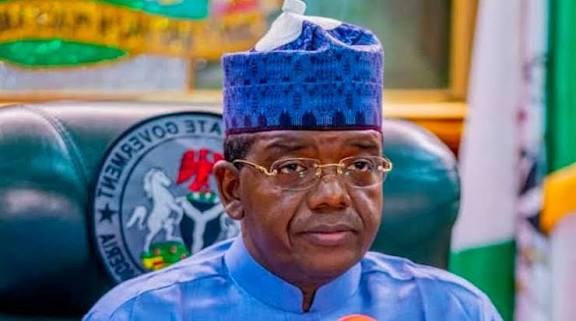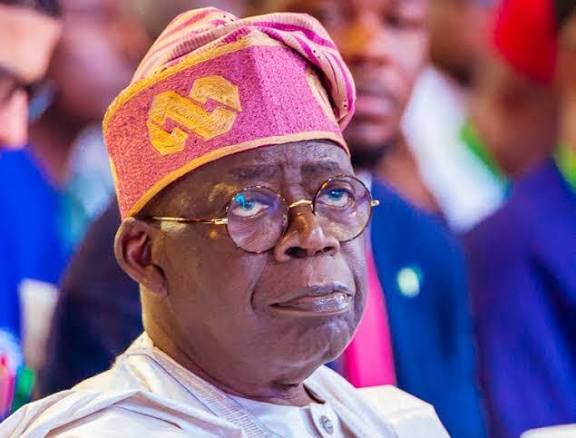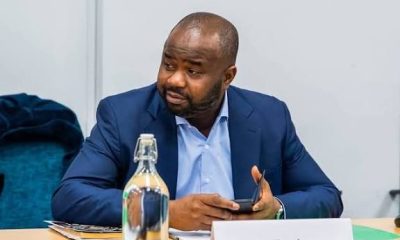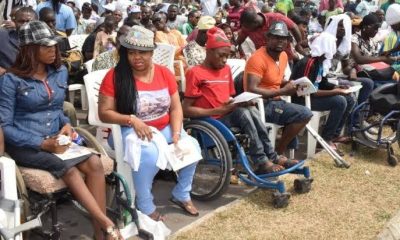News
FCTA Adopts Disability Act, Plans Implementation Commission

By Adeleke Jason
The Federal Capital Territory Administration (FCTA), through its Women Affairs Secretariat, has commenced the adoption of the Discrimination Against Persons with Disabilities (Prohibition) Act 2018 and is considering the establishment of a commission to oversee its implementation.
Dr. Adedayo Benjamins-Laniyi, Mandate Secretary of the Women Affairs Secretariat, made the disclosure during a three-day workshop on a rights-based approach to disability-inclusive development, governance, and public policy.
The workshop, held in collaboration with the World Bank, brought together management staff and stakeholders from various sectors across the FCT.
Here’s a rewritten, concise, and cohesive version of the provided passage to suit a news report format:
Benjamins-Laniyi explained that the workshop also aimed to develop a strategic framework for the establishment of the FCT Disability Commission, which will be instrumental in ensuring the full implementation of the Act.
She described the Discrimination Against Persons with Disabilities (Prohibition) Act as a vital piece of legislation designed to protect the rights of persons with disabilities and promote their inclusion across all sectors of society.
According to her, domesticating and implementing the Act in the FCT is a significant step toward creating a more inclusive and accessible environment for all.
“This workshop is designed to equip us with the technical knowledge, skills, and orientation needed for the effective domestication and implementation of the Act,” she said. “I am confident that the deliberations over the next three days will yield valuable insights and practical solutions for advancing disability inclusion.”
Benjamins-Laniyi, the first Mandate Secretary of the Secretariat, reiterated her personal commitment to disability rights, noting that the creation of a Disability Desk under her leadership underscores that commitment.
“This desk focuses on ensuring that women and children with disabilities have their needs addressed and enjoy equal access to opportunities and services,” she said.
She also expressed gratitude to the World Bank for its continued support in promoting the rights of persons with disabilities and assured participants of FCT Minister Nyesom Wike’s commitment to the cause, describing it as a “capital project worthy of attention.”
“Let us work together to make the FCT a model of inclusion and accessibility, where persons with disabilities can thrive and reach their full potential,” she added. “Nothing about persons with disabilities without them — their voices must be part of every decision that affects them.”
Also speaking at the event, Hadjia Majida Adamu, Special Assistant to the FCT Minister of State and Coordinator of the Social Investment Programme, praised Benjamins-Laniyi for taking the bold step. She described the workshop as a key move toward building a society where every individual, regardless of ability, is granted equal opportunity.
“This initiative demonstrates the FCT’s commitment to removing barriers and integrating persons with disabilities into all facets of social, economic, and governance life,” Adamu said.
Mr. Rex Irame, a legal practitioner and Chairman of the Albinism Association of Nigeria, FCT Chapter, underscored the importance of focusing on the implementation of the Disability Act.
“If we don’t take the issue of implementation seriously, it takes away the beauty of the Act,” he cautioned.
In response, Dr. Adebukola Adebayo, Disability Inclusion Consultant with the World Bank, expressed confidence in the Act’s successful implementation, citing the involvement of a broad range of stakeholders and government agencies.
“The FCTA has done the needful by ensuring that all government institutions and key stakeholders are carried along,” he said. “This inclusive approach has broadened the foundation for implementing the disability policy in the FCT.”
Dr. Adebayo noted that all parties—including the proposed commission—would work collaboratively with the support of the World Bank and other partners to ensure that the Act moves beyond legislation and into action.
He further revealed that the World Bank would provide technical assistance to the Women Affairs Secretariat in formulating the FCT Disability Policy. Additionally, the Bank will support the establishment of the FCT Disability Commission and help strengthen inter-agency collaboration.
According to him, these steps are critical to achieving full implementation of the disability policy in alignment with the National Disability Act.
News
Activists confess receiving N500m Naira to blackmail Tinubu’s Minister Matawalle, beg for forgiveness

Five civil society activists and media operatives on have openly confessed to being part of a N500 million coordinated blackmail campaign against the Minister of State for Defence, Dr. Bello Mohammed Matawalle, and tendered an unreserved public apology to him.
The activists, led by Comrade Aryan Abdul Kareem, made the shocking revelation at a press conference in Gusau, the Zamfara State capital.
Speaking on behalf of Comrade Olumu Lucky, Comrade Olukayode Williams, Comrade John Osumbor Mark, and Engineer Bashir Muhammad, Kareem disclosed that the entire operation was sponsored and supervised by the administration of Governor Dauda Lawal Dare through his Spokesperson, Sulaiman Bala Idris.
According to the group, Sulaiman Bala Idris personally convened several secret meetings where they were briefed, handed instructions, and provided with funds.
The campaign, they said, cost “above five hundred million naira” and involved recruiting social media influencers, bloggers, political commentators, conventional media houses, and prominent Zamfara politicians including Senator Kabiru Marafa and Sani Abdullahi Shinkafi.
“We were part of that machinery. We accepted money and roles to circulate damaging and false narratives against Dr. Bello Matawalle even though we knew they were lies. We chose financial inducement over conscience,” Kareem admitted.
The activists said their actions caused “serious emotional pain, reputational damage and distress” to the Minister, his family, and supporters, adding that after deep reflection, they decided to come clean.
“Today, we tender our unreserved apology to His Excellency, Dr. Bello Mohammed Matawalle, and to every Nigerian who was misled by the falsehood we helped spread. We beg for his forgiveness and the forgiveness of the public. This apology is born out of genuine remorse,” the statement read.
The group further declared readiness to face any legal or moral consequences, stating that they possess “documentary evidence” of every transaction and meeting, including with Governor Lawal’s Spokesperson.
“We are ready to submit all the evidence and cooperate fully with the EFCC, DSS, police or any competent authority that wishes to investigate this matter,” they affirmed.
While urging other participants in the alleged plot to also confess, the activists said their decision was aimed at cleansing their conscience and helping to enthrone truth and accountability in Nigerian politics.
News
Security Agencies Uncover Plot to Stage Protest Against President Tinubu, NSA Ribadu

Nigeria’s security agencies have reportedly uncovered a plan by some opposition politicians to organise protests in Sokoto and other northern states against President Bola Tinubu and National Security Adviser Nuhu Ribadu.
Fresh intelligence reports made available to journalists on Friday show that former Senator Kabiru Marafa is the main arrowhead of the plot.
The group is allegedly working to discredit NSA Nuhu Ribadu and the Minister of State for Defence, Bello Matawalle, by falsely linking them to bandit groups and using a Sokoto-based militia to trigger violent protests.
Sources say the Zamfara State Government, led by Governor Dauda Lawal, is strongly backing the plan and providing funding, determined to paint the federal security team as incompetent and force the removal of both Ribadu and Matawalle.
Security operatives detected the scheme this week, monitored several planning meetings in Gusau and Abuja, blocked funding channels, and quietly disrupted the operation.
No arrests have been made, but all the key figures are now under close surveillance.
The key figures are now being monitored by security agencies to track their key sources of funding.
News
Security Agencies Uncover Plot to Stage Protest Against President Tinubu, NSA Ribadu

Nigeria’s security agencies have reportedly uncovered a plan by some opposition politicians to organise protests in Sokoto and other northern states against President Bola Tinubu and National Security Adviser Nuhu Ribadu.
Fresh intelligence reports made available to journalists on Friday show that former Senator Kabiru Marafa is the main arrowhead of the plot.
The group is allegedly working to discredit NSA Nuhu Ribadu and the Minister of State for Defence, Bello Matawalle, by falsely linking them to bandit groups and using a Sokoto-based militia to trigger violent protests.
Sources say the Zamfara State Government, led by Governor Dauda Lawal, is strongly backing the plan and providing funding, determined to paint the federal security team as incompetent and force the removal of both Ribadu and Matawalle.
Security operatives detected the scheme this week, monitored several planning meetings in Gusau and Abuja, blocked funding channels, and quietly disrupted the operation.
No arrests have been made, but all the key figures are now under close surveillance.
The key figures are now being monitored by security agencies to track their key sources of funding.
-

 News3 months ago
News3 months agoCSOs fault DAPPMAN’s ₦75 per litre coastal freight cost demand
-

 Uncategorized1 month ago
Uncategorized1 month agoParacetamol Use in Pregnancy Doesn’t Cause Autism, New Study Confirms
-
Uncategorized3 months ago
Consumer Forum Urges FG, DSS to Investigate Desperate Efforts by PENGASSAN to Shut Down Dangote Refinery
-

 News3 weeks ago
News3 weeks agoBreaking: FBNQUEST: Nestoil and Neconde are not under any receivership
-

 News3 months ago
News3 months agoCSOs To Tinubu: Hold DAPPMAN, Labour Unions Responsible For Breakdown Of Law, Order
-
News1 month ago
NGO Empowers 150 Girls with Disabilities in FCT to Promote Inclusive Education
-

 News1 month ago
News1 month agoCoalition Backtracks, Apologises To FIRS Chairman Adedeji Over False Allegations
-

 News3 weeks ago
News3 weeks agoExposed: Mr Femi Otedola, accused of Aggressive Banking Gangsterism





